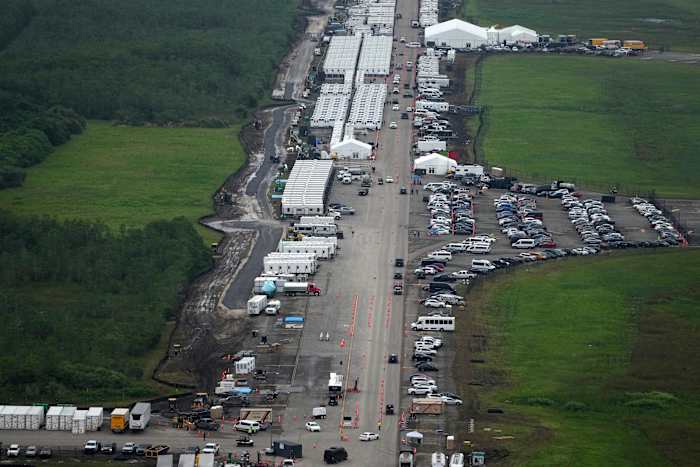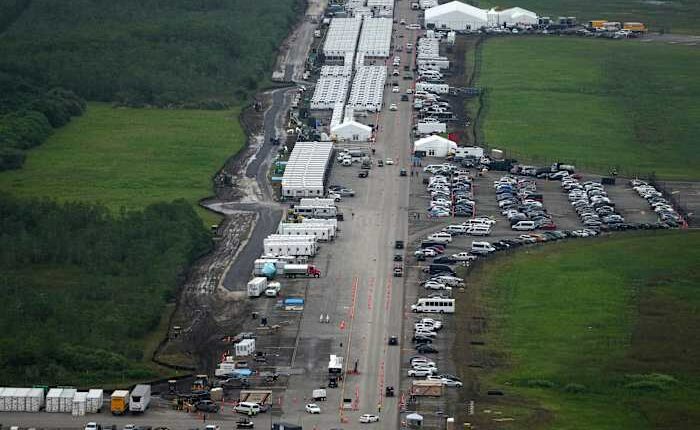Share this @internewscast.com

TALLAHASSEE, Fla. – Lawyers representing immigrants detained at a secluded location in the Everglades urged a federal judge on Monday to require state and federal authorities to provide adequate legal representation access. This includes private consultations and secure documents, as they argued the detainees could suffer “serious harm” without judicial intervention.
The case, presented to U.S. District Judge Rodolfo Ruiz, is based on a lawsuit initiated last month by the American Civil Liberties Union of Florida, Americans for Immigrant Justice, and immigration attorneys. They argue that there have been First Amendment and due-process rights violations.
The court session explored claims that the detainees in the facility, known as “Alligator Alcatraz,” are unable to have in-person or online confidential meetings with their lawyers as legally required. Additionally, they cannot reach immigration judges to challenge detention or deportation.
A potential resolution surfaced over the weekend when U.S. Department of Homeland Security Secretary Kristi Noem noted that immigration judges at the Krome North Processing Service Center would oversee the detainees’ cases. Krome, a detention center in Miami, already hosts immigration hearings.
[WATCH: DACA recipient transferred from Alligator Alcatraz to Glade County Jail]
Nicholas Meros, representing Governor Ron DeSantis’ administration, stated progress in facilitating confidential attorney-client meetings in “private rooms with doors” and creating a method for exchanging legal papers. The state mentions that the delay was due to the swift construction of the facility.
“With each passing day, more access is granted,” Meros explained, emphasizing that “no requests for meetings have been rejected by the state defendants.”
Eunice Cho, an attorney for the ACLU, argued that the officials at the facility are still failing to comply with federal standards requiring detainees and their attorneys be provided with policies about procedures and indicated that information about how the site is operated and who is detained there continues to be shrouded in secrecy.
[WATCH: New Florida CFO defends DOGE, ‘Alligator Alcatraz’]
Cho also disputed that video conferences between detainees and their legal teams are private.
“The video conferences take place in a cage that is made out of chain link fence” where call participants “have seen people walk in and out of the frame,” she said.
Cho also pointed to a “lack of clear public information about what the appropriate email address should be” for attorneys to request video conferences with their clients, something she said every other immigration detention center provides.
Ruiz acknowledged that “some of the delays” are still ongoing.
“There does seem to be a live case for controversy about delays or timing issues,” the judge said.
Monica Rodriguez, an attorney for the U.S. Department of Justice, argued that the plaintiffs’ claims are rooted in their dissatisfaction with the detention center’s location.
“It just seems that, at the core, no matter what the creative approaches to the pleadings are, it’s really about the decision of the attorney general, of DHS (Department of Homeland Security), of the executive branch, to bring detainees to Alligator Alcatraz,” Rodriguez said.
Ruiz also raised questions about a lack of an agreement showing that the federal government had given the state the authority to operate the facility.
Numerous state agencies have agreements, known as “287 (g) agreements,” giving state law-enforcement officers authority to participate in federal immigration enforcement activities.
But Ruiz said Monday that no such agreement exists for the Everglades site.
“As far as I can tell, there is not a single 287 agreement that a state defendant in this action even signed,” Ruiz said. “Certainly, there could be a disconnect from what is required by 287 and ICE (Immigration and Customs Enforcement) standards and what is being done under the rise of this federal authority ceded to the state in how it’s running.”
Violations of the federal agreement — if it exists — aren’t an issue in the lawsuit about inadequate legal representation.
But the absence of such a pact could mean that the state is overstepping its authority to detain undocumented immigrants at the Everglades complex, according to attorney Catherine Blankenship, who represents one of the plaintiffs in the lawsuit.
[RELATED: Florida governor holds conference on flights out of ‘Alligator Alcatraz’]
The state “basically admitted that they have not executed 287 (g) agreements, which begs the question of how are they lawfully detaining people at this facility,” Blankenship told The News Service of Florida. “I think there is going to be litigation on this … and the overall illegality of this facility very soon.”
Monday’s two-hour hearing focused largely on state and federal officials’ contention that the lawsuit, which was filed in the federal court’s Southern District of Florida, should be transferred to the Middle District of Florida — a position the judge appeared to support.
State officials built the detention complex, which state Division of Emergency Management Director Kevin Guthrie said last week held 1,000 people and has a capacity for 2,000, adjacent to an airstrip in the Everglades known as the Miami-Collier Training and Transition Airport.
The state maintains that a “sliver” of the airport is in Miami-Dade County, which is in the federal Southern District of Florida. The address of the detention center is in Ochopee, an unincorporated community in Collier County, which is in the Middle District of Florida.
The court “venue” issue “continues to be a very significant concern,” Ruiz said.
“It just seems to me today, with this record, that the state defendants are running the facility, not the federal defendants. … That to me is the hardest sell, that these state defendants are committing a First Amendment violation anywhere but near the facility or at the facility in the Middle District of Florida,” the judge told Cho.
Cho urged Ruiz to issue a preliminary injunction ensuring detainees have adequate legal representation. Some people being held at the Everglades site are in the process of having their immigration status reviewed and do not have what are known as removal orders, attorneys for the plaintiffs have argued. Ruiz did not issue a ruling Monday.
“What has happened at Alligator Alcatraz is unprecedented and is not normal,” Cho said.
Cho pointed to one detainee at the site who was erroneously deported to Guatemala while he was in immigration proceedings without a final order for removal. Also, she said officers are pressuring detainees to sign voluntary removal orders. An intellectually disabled detainee signed a form he was told was a request for a blanket but was “in fact a voluntary departure order,” according to Cho.
“This is why access to counsel is so paramount,” she argued.














